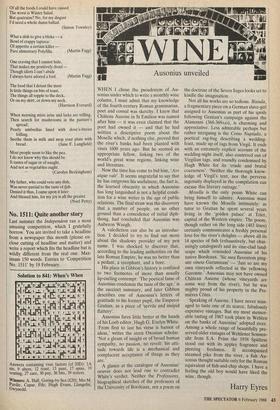Ausonius unveiled
WHEN I chose the pseudonym of Au- sonius under which to write a monthly wine column, I must admit that my knowledge of the fourth-century Roman grammarian, poet and consul was sketchy. I knew that Château Ausone in St Emilion was named after him — it was even claimed that the poet had owned it — and that he had written a descriptive poem about the Moselle which, if nothing else, proved that the river's banks had been planted with vines 1600 years ago. But he seemed an appropriate fellow, linking two of the world's great wine regions, linking wine and literature.
Now the time has come to bid him, 'Ave atque vale'. It seems ungrateful to say that he has outgrown his usefulness; the fact is, the learned obscurity in which Ausonius has long languished is not a helpful condi- tion for a wine writer in the age of public relations. The final straw was the discovery that a number of people, on no other ground than a coincidence of initial diph- thong, had concluded that Ausonius was Auberon Waugh.
A valediction can also be an introduc- tion. I decided to try to find out more about the shadowy provider of my pen name. I was shocked to discover that, according to the leading authorities on the late Roman Empire, he was no better than a pedant, a sycophant, and a bore.
His place in Gibbon's history is confined to two footnotes of more than usually lip-curling contempt: 'The poetical fame of Ausonius condemns the taste of the age,' is the succinct summary, and later Gibbon describes one of Ausonius's letters of gratitude to his former pupil, the Emperor Gratian, as a piece of 'servile and insipid flattery'.
Ausonius fares little better at the hands of his Loeb editor, Hugh G. Evelyn White. `From first to last his verse is barren of ideas,' writes the stern Oxonian scholar.
`Not a gleam of insight or of broad human sympathy, no passion, no revolt: his atti- tude towards life is a mechanical and complacent acceptance of things as they are.'
A glance at the catalogue of Ausonius' oeuvre does not lead one to contradict White's verdict. Neither the Professores, biographical sketches of the professors of the University of Bordeaux, nor a poem on the doctrine of the Seven Sages looks set to kindle the imagination.
Not all his works are so tedious. Bissula, a fragmentary piece on a German slave-girl assigned to Ausonius as part of his spoils following Gratian's campaign against the Alamanni (368-369AD), is charming and appreciative. Less admirable perhaps but rather intriguing is the Cento Nuptialis, a poetical rag-bag describing a wedding- feast, made up of tags from Virgil. It ends with an extremely explicit account of the wedding-night itself, also contrived out of Virgilian tags, and roundly condemned by Hugh White for its 'crude and brutal coarseness'. 'Neither the thorough know- ledge of Virgil's text, nor the perverse ingenuity displayed in the compilation can excuse this literary outrage.'
Mosella is the only poem White can bring himself to admire. Ausonius must have known the Moselle intimately: as tutor to Gratian he spent several years living in the 'golden palace' at Trier, capital of the Western empire. The poem, though rather on the long side (483 lines) certainly communicates a freshly personal love for the river's delights — above all its 14 species of fish (exhaustively, but char- mingly catalogued) and its vine-clad land- scape which reminded Ausonius of his native Bordeaux. 'Sic mea flaventem ping- unt vineta Garumnam' 'Just so are my own vineyards reflected in the yellowing Garonne.' Ausonius may not have owned Château Ausone (whose vineyards are some way from the river), but he was mighty proud of his property in the Pre- mières C6tes.
Speaking of Ausone, I have never man- aged to taste one of its scarce, fabulously expensive vintages. But my most memor- able tasting of 1987 took place in Wehlen on the banks of Ausonius' adopted river. Among a whole range of beautifully pre- served older vintages of Wehlener Sonnen- uhr from S.A. Prnm the 1958 Spatlese stood out with its appley fragrance and piercing freshness. It accompanied steamed pike from the river, a fish Au- sonius thought suitable only for the Roman equivalent of fish-and-chip shops. I have a feeling the old boy would have liked the wine, though.
Harry Eyres


















































 Previous page
Previous page